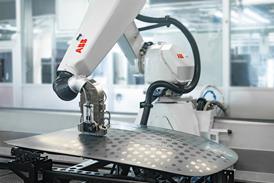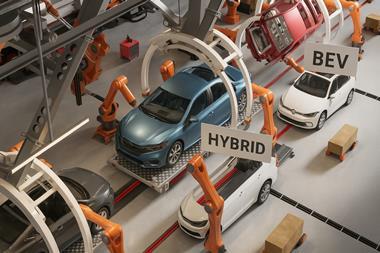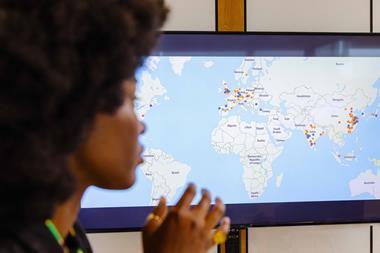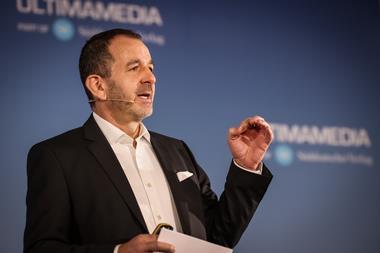As one site in a huge global network, Continental’s plant near Frankfurt provides a fine example of how improvement by knowledge sharing comes in forms both old and new
 Every morning at 9am, the managing director of Continental’s plant at Karben, Germany takes a gemba walk. Following a different route each day, Jürgen Martin stays in touch with production lines and operators at the facility near Frankfurt, one of Continental’s 30 electronic component plants distributed around the world.
Every morning at 9am, the managing director of Continental’s plant at Karben, Germany takes a gemba walk. Following a different route each day, Jürgen Martin stays in touch with production lines and operators at the facility near Frankfurt, one of Continental’s 30 electronic component plants distributed around the world.
The notion of gemba (which translates from Japanese as “the real place”) is to visit the frontline and see the opportunities for improvement. Walking through the 21,000 sq.ft production area gives Martin the chance to literally stay in touch. He sees for himself and finds out from the operators what problems there have been and how they were solved, and monitors performance. Teams are encouraged to come forward and say if the hurdles are too high. They can ask the management for help, but the team ultimately decides on changes.
“We put a lot of responsibility onto our people to help them identify with what they are doing,” explains Martin. “We generate motivation through their deep identification with the product and the process, the work they do and also their location. It is very important to work with people to train and educate them, enabling them to operate their own small business area.”

This approach has a slogan: Sinn, Spass, Stolz – which translates from German as: Sense, Fun, Pride. It’s a familiar term within the lean manufacturing philosophy, Martin says, and leads ultimately to successful kaizen: “This is my vision and expectation, improvements every day,” he states.
The Karben facility was established 25 years ago, helping Continental move away from the busy centre of Frankfurt. It’s a quieter, roomier location that now houses operations with around 1,000 members of staff – including 850 plant operators, technicians, engineering management and technical support. The core business of the plant is to produce the surface-mounted devices.
From printed circuit boards (PCBs) to the highly durable shock- and temperature-resistant ceramic substrate technology, destined for the heart of climate-control, fuel sensors and other instrument cluster functions, plus inverters for hybrid and EV vehicles. Over 100,000 products leave the factory each day, many for internal automotive group customers in the Continental global network.
Worldwide coverageWith more than 200 locations around the world, Continental has plants making a huge range of products, from tyres to turbochargers. A large portion of the these are in the Nafta region, as well as Europe, Asia and Australia.
“There is a corporate saying, ‘in the market for the market’,” Martin explains. The global spread of the company has many benefits, transport savings key among them. The responsibilities for day-to-day operations stays fully on each site, however new directions such as Industry 4.0, big data, business intelligence or manufacturing execution systems (MES) are helping best practice messages the world over.
"We have a target [at Karben] to run a lights-off line, in other words, continuing the line while no human operators are here. At the same time, we can support a lights-off line and predict problems before they happen, say, if a part stock is running low." – Jürgen Martin, Continental
“We are always looking for leading solutions and looking to optimise productivity indirectly and directly,” Martin explains, “It makes absolute sense that plants don’t duplicate their efforts, as our customers will not pay again and again for the introduction of a manufacturing execution system, for example, in 30 different plants.”
The expectation is, however, that Continental can make everything anywhere. Of course, when it establishes a new plant, it needs a strategy. It may take years to develop the plant, step-by-step, to reach a point where it is independent in terms of day-to-day operations. Each new plant is designated a “sister plant” from among the established facilities to act as a model and exemplar to the new operation.
From a reporting perspective, Continental has different levels across corporate and financials, as well as performance indicators on the machinery side. The level below the operational level, the plant managers, handle more detailed and more frequent reporting.
Below that, KPIs are monitored across different lines and different products. “Here we can deal with questions such as idle time, unplanned stoppages and so on,” says Martin. This is where his daily gemba walks come in. His is just one of many undertaken by colleagues at Karben.
“We have a system every day where we make gemba walks within production so management, team leaders, line leaders and technicians make their gemba walks.”
 Sharing knowledgeThe value obtained from the daily gemba walks goes much further than Karben. A formal ‘lessons-learned’ system operates to record questions about whether improvements are specific to a location or whether it would be useful to others. If the improvement relates to products also in production elsewhere, for example, in China or Romania, the system can pass on the intelligence for review, consideration and feedback.
Sharing knowledgeThe value obtained from the daily gemba walks goes much further than Karben. A formal ‘lessons-learned’ system operates to record questions about whether improvements are specific to a location or whether it would be useful to others. If the improvement relates to products also in production elsewhere, for example, in China or Romania, the system can pass on the intelligence for review, consideration and feedback.
“We have the same process for quality-related tasks, quality alert, and we also have logistics one,” says Martin. “If one location is low because of an unusual high demand, we can put out the call for help asking for extra supplies or even just advice from those sites that have had similar experience.”
There is a formal process behind this, controlled from a large database. Any site can retrieve historic information. If it is facing a problem, maybe the kaizen was already done elsewhere. The transparency of all this data aids the continuous improvement.
At Continental, there is a big focus on big data. As a supplier of safety components. “This has been the case for decades,” says Martin, “but now we have new functionality in analytics. So, our target is to find trends, themes, abnormalities, behaviour and structure. We are now testing a cloud-based business intelligence system. It is a project using all the terabytes of data we have collected for decades and means reports from the production lines and processes are fed in. There are dedicated dashboards to show how our plants are performing.”
 Jürgen Martin, MD at Continental's Karben plant
Jürgen Martin, MD at Continental's Karben plantFrom Continental’s Karben plant MD Jürgen Martin’s point of view, the next step in industrialisation comes in the form of collaborative robotics. “When you look to automation you have a lot of complex lines combining, which can be difficult to understand and with limited flexibility,’ he states. “Changeover is not so easy, so you need a lot of know-how to run the line.” The typical automation of the past was customised but using cobots means it can be standardised, Martin says. “You have to pay to customise, to design and to build it a production line, a unique line design for one purpose. Standardising automation brings down costs so this is the direction we are going. Collaborative robots are easy to program, easy to replace. We will have lines with collaborative robotics and humans side by side. There are always more features available, they are developing fast– sensors and cameras are all adding to their capabilities.”
Martin sees a huge advantage of cobots in avoiding downtime. Should a cobot develop a problem, the possibility is there to ‘out’ the unit and use a human operator as temporary replacement. It avoids a break in production – a big advantage over the typical situation with customised automation. The collaborative action, of course, goes in both directions: replacing or alternating in both directions – human for cobot, cobot for human – whichever keeps the line running. “We have a target here to run a lights-off line, in other words, continuing the line while no human operators are here,” Martin adds.
“At the same time, we can support a lights-off line and predict problems before they happen. For example, if a part stock is running low.” The plan is that before the line is stopped due to material supply or whatever issue the sensors are picking up, a technician is working on a solution and the problem is solved in advance. Continental is exploring the benefits of cobots at three regional collaborative centres, one in Regensburg, Germany, one in the NAFTA region and one in South Korea. There are already three cobots in Karben: “We started the programme one or two years ago, there are many projects and dedicated plants for different projects because there are huge tasks ahead, we have to optimise the capacities we have,” says Martin.









































